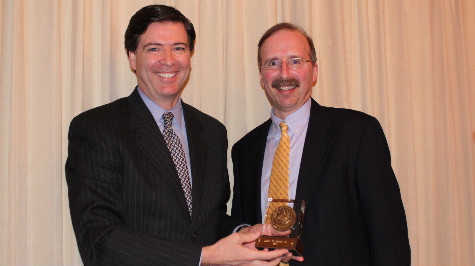Former Deputy Attorney General Honored for Public Service
Former Deputy Attorney General James B. Comey, Jr., a 1982 graduate of the College of William & Mary, was honored by William & Mary Law School on March 14 at a dinner at the Alumni House as the 2010-11 Carter O. Lowance Fellow. The fellowship is one of the highest honors conferred by the Law School and the College in recognition of significant public service.
In remarks at the dinner, Law School Dean Davison M. Douglas likened Comey to the Americans praised by John F. Kennedy in his book "Profiles in Courage." "If John F. Kennedy were alive today," Douglas said, "perhaps he would add another chapter to his book about Jim Comey."
In 2004, Comey became acting attorney general of the United States when Attorney General John Ashcroft was hospitalized. In that role, Comey was asked to certify the legality of the National Security Agency's domestic surveillance program. He declined to do so, citing concerns about some aspects of the program.
It was a situation, Douglas told the audience, in which "a great public servant confronted an incredibly difficult personal decision." Despite significant pressure from the highest levels of government, he noted, Comey held firm to his decision. Comey later described that decision and the events surrounding it in testimony before Congress in 2007.
Comey spent his early career in the U.S. Attorney's Office for the Southern District of New York, where he became the deputy chief of the Criminal Division. He later served as managing assistant U.S. attorney for the Richmond Division of the Eastern District of Virginia.
In 2002, President George W. Bush appointed him U.S. attorney for the Southern District of New York. A year later, the president appointed him deputy attorney general of the United States.
Comey left the Justice Department in 2005. He served from 2005 to 2010 as senior vice president and general counsel of the Lockheed Martin Corporation. In June 2010, he joined Bridgewater Associates, an investment company.
Douglas noted that the fellowship's namesake, Carter O. Lowance, lived "a life of extraordinary public service." Lowance began his career as a reporter for the Roanoke Times and the Associated Press. He enlisted in the Army during World War II and served as a counter-intelligence officer. He parachuted into northern France hours before D-Day. Following the war, he returned to Virginia to begin a thirty-year career as chief executive assistant to six of the Commonwealth's governors. No one, Douglas said, "understood the state as well as Carter Lowance." His knowledge, effectiveness, and integrity as an aide earned him the affectionate nickname of the "little governor." In 1970, he began his service to the College as executive vice president.
Comey is the thirteenth recipient of the Lowance Fellowship, which was first conferred upon Chief Justice William Rehnquist in 1990.
Previous recipients include Paul R. Verkuil, William & Mary's 24th president and a 1961 graduate of the College, former Commander-in-Chief of U.S. Central Command Gen. Anthony C. Zinni, former Virginia Governor and U.S. Senator Charles S. Robb, and former Virginia Attorney General Mark L. Earley, a 1976 graduate of the College.
During his visit, Comey met with law students at events sponsored by the Student Division of the Institute of Bill of Rights Law, the Federalist Society and the American Constitution Society.
Christa Barber, a second-year law student, helped plan one of the events and said that Comey seemed "truly passionate about contributing to society."
"There is definitely something to be said about a person who can advocate for what he believes to be the best course of action, while respecting those around him and remaining open to the views of others," she said. Comey, she added, "seemed incredibly committed to placing the needs of the country and the people before his own ambitions and exemplifies someone who truly desires to serve others."



